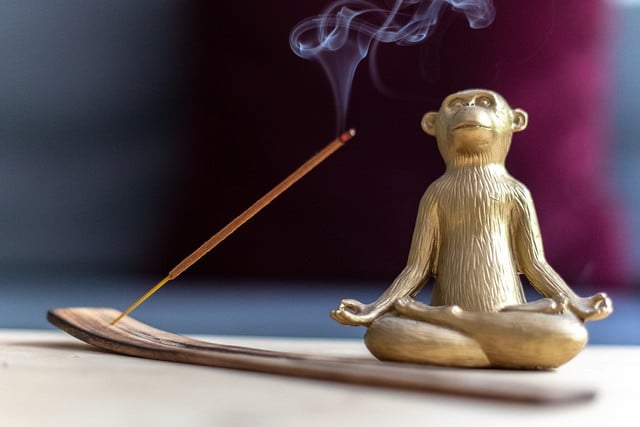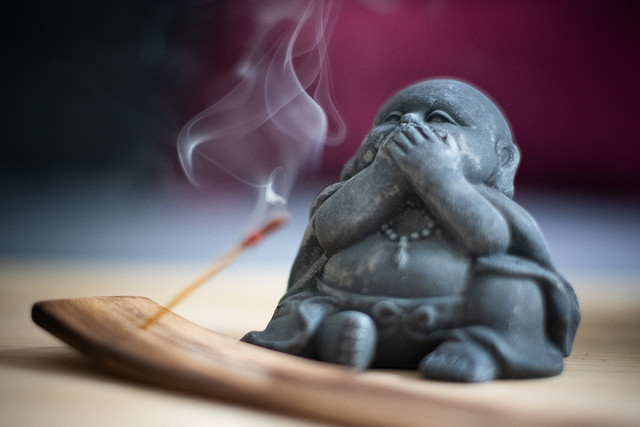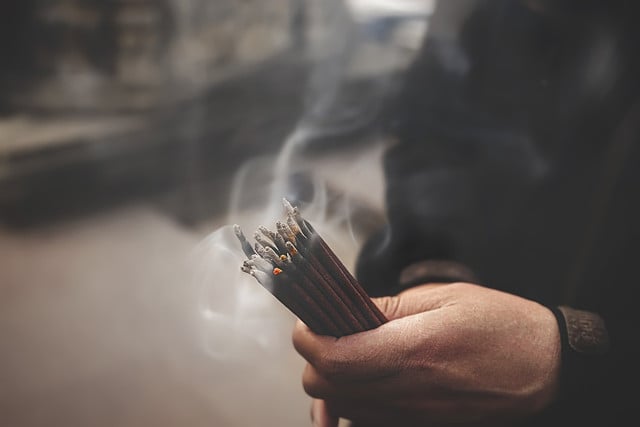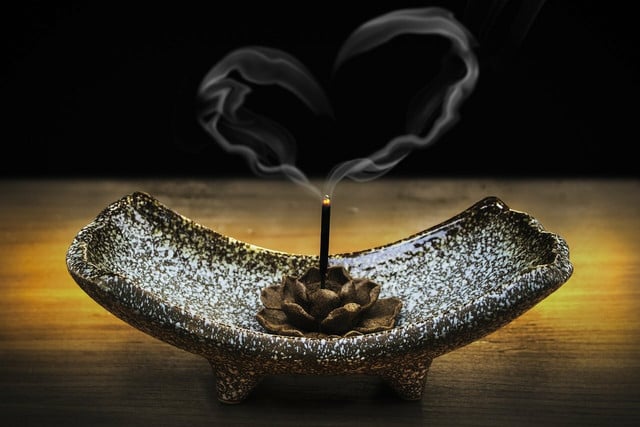Is incense good or bad for you? Mindfulness practices involving incense burning have been around for ages, and remain as popular as ever. Despite its many purported advantages, burning incense may pose certain health risks.
Before we can answer the question ‘is incense bad for you?’ we first must explain why people burn it in the first place. Any plant matter burnt for its fragrant or spiritual effects is considered incense, however, there are many different types of incense you usually find at a local market, store, or online. These include:
- Sticks,
- Spirals /Coils,
- Cones,
- Loose Powders,
- Raw Plant Materials
Incense burning as a Buddhist meditation technique spread with the establishment of Buddhism in India about the year 300 BCE. In China, incense is used in temples, and even incense clocks are used to keep track of time. This practice can be often found today in yoga and meditation, where incense sticks are often used to tell the time.
Incense wrapped onto thin bamboo sticks has been widely utilized outside of China since the 1990s; before this, the more traditional Dhoop (bamboo incense sticks) were used across Southern Asia. In the West and Europe, the charcoal and resin forms of incense were employed in Catholic and Orthodox ceremonies.
The Benefits of Burning Incense

(Foto: CC0 / Pixabay / asundermeier)
Smells elicit reactions in our brains and may serve as powerful triggers for memories or even emotions. Whether you’re starting a project, participating in a ceremony, or simply doing yoga, lighting an incense stick beforehand may help evoke a powerful mood. It’s supposed to enhance focus and enliven the body and mind.
In a nutshell, these are the most prevalent benefits of burning incense in your waking life. Many people throughout centuries have claimed that incense helps them:
- relax and de-stress
- encourage a sense of well-being
- fall asleep
- encourage their focus and the flow of ideas
- filter air
- with Mindfulness Based Stress Reduction techniques like meditation
When performing religious or ceremonial ceremonies in ancient times, incense was used as an aromatic aid. In the modern age, it is frequently appreciated for its fragrance. As a dehumidifier, it has also been used in aromatherapy and even to repel pesky insects.
Safety First: Possible Health Hazards for People
Incense smoke is inhaled much like smoke from any other source. Recent inquiries have been made about the adverse health effects of incense.
Along with its fragrant chemicals, the smoke analyzed in studies included several poisonous and irritating substances that might cause various health issues. Burning incense has been linked to some of the following health conditions:
- Cancer – A study from 2009 established a link between incense consumption and increased cancer risk. The reasons may be minute, inhalable particles that occur when synthetic chemicals in some incense sticks are burned. They identified different forms of cancer, mostly upper respiratory tract or lung malignancies.
- Asthma – In 2007 researchers evaluated over 3,000 students using a questionnaire for information about respiratory symptoms. The research connected incense usage to asthma-related symptoms and wheezing. It also demonstrated a link between incense use and higher asthma medication use.
- Heart Disease – Long-term household incense inhalation was connected to cardiovascular mortality in a study of over 60,000 Singaporeans. Therefore, chronic incense smoke inhalation has been linked to an elevated risk of cardiovascular disease.
- Dermatitis – While burning several incense sticks, airborne synthetic particles from these sticks are emitted into the air and can come into contact with the skin. Contact dermatitis symptoms, such as red, itchy skin, can occur in some individuals with sensitive skin as a result of this.
Is Incense Really Bad for You?



(Foto: CC0 / Pixabay / asundermeier)
What does this tell us? Is incense bad for you after all? Although these findings may be alarming, we advise our readers to be cautious about what studies say. Some issues are affecting the reliability of some studies investigating the links between incense and harmful health conditions.
- Sample sizes are often quite small and as such, should be taken with a pinch of salt.
- Additionally, these studies don’t denote a particularly strong ’cause and effect’ of incense smoke exposure, but rather draw a correlation.
- Likewise, several of the studies claiming certain health risks, like inflammation, or decreased asthma were conducted on animals, and therefore more research upon humans is required before strong lines in the sand can be drawn.
- Another factor that casts some doubt, is that the many varieties of incense contain a multitude of different ingredients. As such, these findings can’t be generalized to every single type of incense.
All of this isn’t to say, that you shouldn’t be careful. The Environmental Protection Agency (EPA) warns that burning incense indoors can raise the risk of certain health issues. Smoking inside increases the risk of inhalation.
However, there is a lack of clarity from the EPA which specifies the quantities of incense that you would need to burn that would contribute to these dangers. Nevertheless, we encourage our readers to burn incense responsibly in a well-ventilated atmosphere and to keep it away from babies and infants.
Note: If you are concerned for your health or that of your children, please always contact a professional like a doctor.
Incense Safety Tips



(Foto: CC0 / Pixabay / truthseeker08)
To minimize the negative health consequences of inhaling incense smoke on a regular basis, we’d like to share some suggestions of steps you can take:
- Open a window or door, after the incense stick has been fully extinguished, as this allows fresh air and better airflow to enter the room afterward
- Don’t burn more than one stick at a time, as the more sticks you burn, the greater your chance of coming into carbon monoxide and other air pollutants.
- Avoid resin incense. Natural incense is always better.
- Avoid if you have had any pre-existing respiratory problems in the past.
- Natural, plant-based incense may assist to lessen the number of air pollutants released into the environment. Often it is the case that the manufacturing process of synthetic involves the usage of hazardous chemicals.
Alternatives to Burning Incense



(Foto: CC0 / Pixabay / truthseeker08)
As we draw our discussion on whether incense is bad for you to a close, it’s perfectly natural that you may be experiencing some apprehensions about burning incense in your home.
However, there are plenty of viable alternatives to burning incense that you can enjoy instead that also aid in aromatherapy and can induce mindfulness. Health concerns seem to be less associated with them but we recommend making informed purchase decisions. Each of them can be utilized in a variety of ways to enhance the odor of an interior space. They include:
- (Homemade) Scented Candles
- Oil Burners (that burn essential oils)
- Candles without lead-core wicks
- Homemade Deodorizers (just mix baking soda and some essential oils, shake, and let it sit)
Read more:
- How to Dry Lavender: Preserving the Scent of Summer
- How to Reduce Stress: 7 Ways to “Decelerate” Your Life
- Mindfulness Based Stress Reduction: Living in the Present
Important Information regarding Health-related Topics.
** Links to retailers marked with ** or underlined orange are partially partner links: If you buy here, you actively support Utopia.org, because we will receive a small part of the sales proceeds. More info.Do you like this post?








